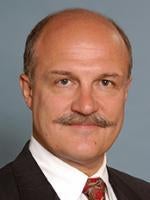In Williamson v. Citrix Online, LLC, No. 2013-1130 (Fed. Cir., June 16, 2015), the Federal Circuit, sitting en banc, overruled earlier opinions and held that the absence of the word "means" does not justify a "strong" presumption that a claim limitation is not subject to section 112, para. 6. It also held that a party seeking to apply section 112, para. 6 was not required to demonstrate "that the limitation essentially is devoid of anything that can be construed as structure." This decision is a significant change in the law, and should be taken into account in litigation and in patent application drafting.
The Williamson decision essentially reverts back to the standard adopted in Personalized Media Communications, LLC v. International Trade Commission, 161 F.3d 696, 703-04 (Fed. Cir. 1998). In that case, the court held that the use of the word "means" in a claim element creates a rebuttable presumption that section 112, para. 6 applies, and, conversely, that the failure to use the word "means" also creates a rebuttable presumption—this time that section 112, para. 6 does not apply.
The Court had departed from the Personalized Media standard in Lighting World, Inc. v. Birchwood Lighting, Inc., 382 F.3d 1354, 1358 (Fed. Cir. 2004), where it applied a heightened standard that "the presumption flowing from the absence of the term 'means' is a strong one that is not readily overcome." Eight years later, in Flo Healthcare Solutions, LLC v. Kappos, 697 F.3d 1367, 1374 (Fed. Cir. 2012), the court added an even more restrictive interpretation, stating, "[w]hen the claim drafter has not signaled his intent to invoke § 112, ¶ 6 by using the term 'means,' we are unwilling to apply that provision without a showing that the limitation essentially is devoid of anything that can be construed as structure."
The en banc court in Williamson, however, concluded that the restrictive interpretations of Lighting World and Flo Healthcare were unjustified because it had "shifted the balance struck by Congress in passing § 112, para. 6 and [had] resulted in a proliferation of functional claiming untethered to § 112, para. 6 and free of the strictures set forth in the statute." Slip op. at 15-16. The court reiterated:
The standard is whether the words of the claim are understood by persons of ordinary skill in the art to have a sufficiently definite meaning as the name for structure. * * * When a claim term lacks the word "means," the presumption can be overcome and § 112, para. 6 will apply if the challenger demonstrates that the claim term fails to "recite sufficiently definite structure" or else recites "function without reciting sufficient structure for performing that function." Watts, 232 F.3d at 880. The converse presumption remains unaffected: "use of the word 'means' creates a presumption that § 112, ¶ 6 applies." Personalized Media, 161 F.3d at 703."
Slip op at 16. Applying the standard, the court held that the claim limitation below was subject to section 112, para. 6.
"[D]istributed learning control module for receiving communications transmitted between the presenter and the audience member computer systems and for relaying the communications to an intended receiving computer system and for coordinating the operation of the streaming data module."
Slip op. at 17. The court characterized "module" as "a well-known nonce word that can operate as a substitute for 'means' in the context of 112, para. 6" because "'module' is simply a generic description for software or hardware that performs a specified function," similar to "[g]eneric terms such as 'mechanism,' 'element,' 'device,' and other nonce words . . .[that] 'typically do not connote sufficiently definite structure.'" Id. The court also observed that the phrase "distributed learning control" does not impart structure into the term "module" because the phrase did not describe a sufficiently definite structure.
The court rejected the patentee's argument based on expert testimony that a skilled person would know how to program a computer to perform the recited functions. "[T]he fact that one of skill in the art could program a computer to perform the recited functions cannot create structure where none otherwise is disclosed." Id. at 19.
The court found the claim was indefinite because the specification failed to disclose an algorithm for performing the claimed function. Id at 22. "The algorithm may be expressed as a mathematical formula, in prose, or as a flow chart, or in any other manner that provides sufficient structure." Id. In that regard, the court found that images of computer displays were insufficient to disclose the algorithm. Id. at 22-24.
This decision highlights the importance of using the statutory formulation where the claim drafter intends to invoke section 112, para. 6, and avoiding the use of functional limitations in connection with "nonce" words. It further highlights the need to include a sufficient disclosure of the corresponding algorithm for any functional language in a claim, even if section 112, para. 6 is not intended. Finally, for issued patents involved in litigation, there is a greater risk that terms using nonce words such as "module" will be found indefinite, as the patents might not have been drafted with the intent that those terms would be subject to section 112, para. 6.



 />i
/>i
